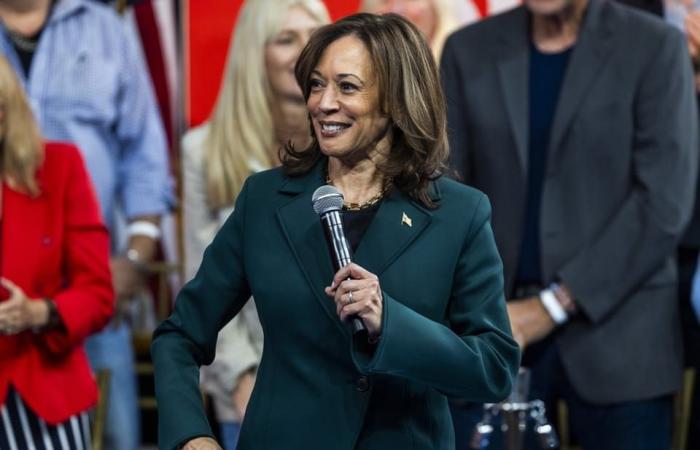Swing states decide: As the name suggests, the swing states swing back and forth. Depending on the starting point, the Republican or the Democratic Party wins there. But always just barely, that’s her characteristic.
Not always the same states: Swing states come and go. When an incumbent president is up for re-election, there are fewer swing states, according to research portal USA Facts Team. However, in every presidential election since 1992, there have always been a few states that narrowly went for the other party. Florida and Nevada, for example, are stubbornly involved from time to time. In contrast, the former swing states of New Mexico and Iowa are now considered almost certainly Democratic and Republican, respectively. Although this could perhaps change again at Iowa 2024.
Republican former President Donald Trump demonstrates a golf swing to his supporters in the swing state of Georgia. (November 3, 2024)
Keystone/AP Photo/Evan Vucci
Factors for a swing state: Demographic changes can influence voting behavior. For example, if the population is growing rapidly or more foreigners are immigrating. The influx of young or older people also has an impact. How states become swing states is also reflected in the economy: The so-called “Rust Belt”, the industrial region in the northeast of the USA, was long considered the “Blue Belt” that was firmly in the hands of the Democrats. But since the collapse of industry in this area, Donald Trump has managed to win more and more of these often unemployed former factory workers to his side. Intensive campaign activities and popular or unpopular candidates can also influence voting behavior and turn a state into a swing state.

Democrat Kamala Harris is campaigning in the most important swing state of Pennsylvania. (October 21, 2024)
Keystone/EPA/Jim Lo Scalzo
Harris prevents even more swing states: Since the election of Donald Trump in 2016, Arizona, Georgia, Michigan, Pennsylvania and Wisconsin have been swing states. North Carolina and Nevada were added four years ago. The fact that there weren’t more is due to Joe Biden’s departure from the presidential race. After his botched appearance in the television debate against Donald Trump, surveys and a media report from “Deutschlandfunk” showed that Trump could win in democratic states such as New Hampshire, Maine, Virginia or Minnesota. After Joe Biden decided not to run for a second time, Kamala Harris overtook Donald Trump in these states.
Strongly Republican or Democratic
Open the box
Box zuklappen
The number of swing states can vary, but in other states the Republican and Democratic parties can rely on stable majorities. The Democrats’ blue states are in the northeast of the USA, on the Great Lakes and on the West Coast: California, New York and Illinois are considered strongholds of the center-left party.
Among Republicans, the most loyal voters are in the South. Many conservative, evangelical Christians live there. Texas is a safe bet for the Grand Old Party, as are Alabama and Oklahoma. The “mountain states” Montana, Wyoming and Idaho are also deep red.
Unusual voting system: With the US electoral system, the candidate with the most votes does not necessarily win because the individual states are allocated electors based on population. It is also crucial to choose the right swing states for yourself. In other words, those who have as many voters as possible. This explains the great battle for Pennsylvania; With 19, this is currently the state with the largest number of voters among the swing states. Whoever wins Pennsylvania already has an advantage. Because even if a candidate only received 50.1 percent of the votes cast in the state, the full 19 electors will be allocated to him. The votes of 49.9 percent of voters will then no longer count. In short: The winner takes it all. Except in Maine and Nebraska – they divide their electors according to proportional representation.








